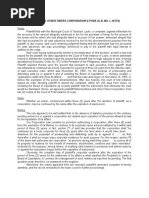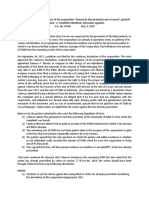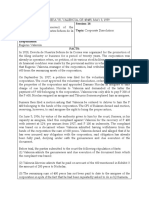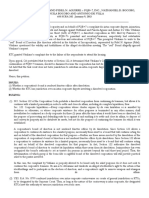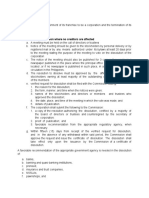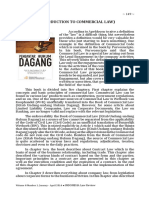Reburiano vs. CA
Reburiano vs. CA
Uploaded by
Karyl Ann Aquino-CaluyaCopyright:
Available Formats
Reburiano vs. CA
Reburiano vs. CA
Uploaded by
Karyl Ann Aquino-CaluyaOriginal Title
Copyright
Available Formats
Share this document
Did you find this document useful?
Is this content inappropriate?
Copyright:
Available Formats
Reburiano vs. CA
Reburiano vs. CA
Uploaded by
Karyl Ann Aquino-CaluyaCopyright:
Available Formats
113. REBURIANO VS.
CA
G.R. No. 102965. January 21, 1999
Doctrine:
Every Corporation whose charter expires by its own limitation or is annulled by forfeiture or
otherwise, or whose corporate existence for other purposes is terminated in any other manner,
shall nevertheless be continued as a body corporate for three (3) years after the time when it
would have been so dissolved, for the purpose of prosecuting and defending suits by or against
it and enabling it to settle and close its affairs, to dispose of and convey its property and to
distribute its assets, but not for the purpose of continuing the business for which it was
established.
Facts:
RTC rendered judgment ordering Reburiano to pay P55,000.00 with interest in favor of Pepsi
Cola Bottling for the unpaid bottles it received from the company. RTC executed writ of
execution however, before the promulgation of the decision of the RTC, Pepsi cola amended its
AOI shortening its corporate term of existence. RTC was not notified of the fact. Reburirano
then moved to quash the writ of execution contending that Pepsi cola in amending its AOI has
no longer juridical capacity to sue and to be sued.
Issue:
Whether a dissolved and non-existing corporation loses its juridical capacity to sue.
Ruling:
No. Every Corporation whose charter expires by its limitation or is annulled by forfeiture or
otherwise, or whose corporate existence for other purposes is terminated in any other manner,
shall nevertheless be continued as a body corporate for three (3) years after the time when it
would have been so dissolved, for the purpose of prosecuting and defending suits by or against
it and enabling it to settle and close its affairs, to dispose of and convey its property and to
distribute its assets, but not for the purpose of continuing the business for which it was
established.
At any time during said three (3) years, said corporation is authorized and empowered to
convey all of its property to trustees for the benefit of stockholders, members, creditors, and
other persons in interest. However, a corporation that has a pending action and which cannot
be terminated within the three-year period after its dissolution is authorized under Sec. 122 of
the RCCP to convey all its property to trustees to enable it to prosecute and defend suits by or
against the corporation beyond the three-year period.
Although private respondent did not appoint any trustee, yet the counsel who prosecuted and
defended the interest of the corporation in the instant case and who in fact appeared in behalf
of the corporation may be considered a trustee of the corporation at least with respect to the
matter in litigation only.
You might also like
- Evidence 2022 RianoDocument204 pagesEvidence 2022 RianoKaryl Ann Aquino-Caluya100% (5)
- DE Form Dissolution Resolution - 23920222 v1Document5 pagesDE Form Dissolution Resolution - 23920222 v1tara75% (4)
- Ingles - TaxDocument324 pagesIngles - TaxKaryl Ann Aquino-CaluyaNo ratings yet
- RWA Draft Agreement - SMS Lakeview ApartmentDocument6 pagesRWA Draft Agreement - SMS Lakeview ApartmentVig LalNo ratings yet
- Reburiano vs. CA G.R. No. 102965Document1 pageReburiano vs. CA G.R. No. 102965Marianne AndresNo ratings yet
- CASE DIGEST - Alabang Development Corporation VS Alabang Hills Village AssociationDocument2 pagesCASE DIGEST - Alabang Development Corporation VS Alabang Hills Village AssociationGladys Cañete100% (2)
- Vigilla Vs Philippine College of Criminology IncDocument2 pagesVigilla Vs Philippine College of Criminology Inchappymabee100% (2)
- Doran ComplaintDocument4 pagesDoran ComplaintWade Smith - Executive ProducerNo ratings yet
- SEC-OGC Opinion No. 24-09 (07!28!2009) - Esguerra and Blanco Law OfficesDocument4 pagesSEC-OGC Opinion No. 24-09 (07!28!2009) - Esguerra and Blanco Law OfficesSyElfredGNo ratings yet
- Reburiano V CA and Other Digests Under DissolutionDocument5 pagesReburiano V CA and Other Digests Under DissolutionNathalie LimNo ratings yet
- Corpo Digest 13 PDFDocument23 pagesCorpo Digest 13 PDFCA DTNo ratings yet
- SEC OGC Opinion No. 08-17Document4 pagesSEC OGC Opinion No. 08-17rodrigoNo ratings yet
- Liquidation of CompanyDocument4 pagesLiquidation of CompanyRufino Gerard Moreno IIINo ratings yet
- PDF Dissolution CORPDocument6 pagesPDF Dissolution CORPAngelique PortaNo ratings yet
- LEGRES Final PaperDocument5 pagesLEGRES Final PaperAnna VeluzNo ratings yet
- Topic Dissolution and Winding Up-Liquidation and Winding Up Case Name Tiburcio Sumera Vs Eugenio Valencia G.R. No. G.R. No. 45485 FactsDocument1 pageTopic Dissolution and Winding Up-Liquidation and Winding Up Case Name Tiburcio Sumera Vs Eugenio Valencia G.R. No. G.R. No. 45485 FactsnikkimaxinevaldezNo ratings yet
- 103 G.R. No. L 18956 Republic Vs MarsmanDocument2 pages103 G.R. No. L 18956 Republic Vs MarsmanKaryl Ann Aquino-CaluyaNo ratings yet
- SECTION 122-Corporate LiquidationDocument1 pageSECTION 122-Corporate LiquidationJhonna BongalosNo ratings yet
- DissolutionDocument5 pagesDissolutionSuzette AbejuelaNo ratings yet
- Chapter 16 & 17 - Dissolution CombinationsDocument19 pagesChapter 16 & 17 - Dissolution CombinationsHoney BiNo ratings yet
- Dissolution and Liquidation CasesDocument6 pagesDissolution and Liquidation CasesOlan Dave LachicaNo ratings yet
- National Abaca Vs Pore DigestDocument3 pagesNational Abaca Vs Pore DigestmarezaNo ratings yet
- National Abaca Vs Pore DigestDocument3 pagesNational Abaca Vs Pore DigestcrapshoxNo ratings yet
- Alabang Development Corporation Vs Alabang Hills VillageDocument3 pagesAlabang Development Corporation Vs Alabang Hills VillageNath AntonioNo ratings yet
- National Abaca and Other Fibers Corporation VDocument1 pageNational Abaca and Other Fibers Corporation VcyhaaangelaaaNo ratings yet
- Dissolution and Liquidation, Foreign CorpDocument20 pagesDissolution and Liquidation, Foreign CorpAustine Clarese VelascoNo ratings yet
- RP Vs MarsmanDocument2 pagesRP Vs MarsmanCha100% (1)
- Sec-Ogc Opinion No. 09-15Document8 pagesSec-Ogc Opinion No. 09-15sweetlunacy00No ratings yet
- DissolutionDocument13 pagesDissolutionidkdumpagainNo ratings yet
- Corporation Law Finals Atty LadiaDocument13 pagesCorporation Law Finals Atty LadiaMyla Rodrigo100% (1)
- Clemente v. CADocument2 pagesClemente v. CAcelestinaferenciaNo ratings yet
- F. Corporate Books and RecordsDocument12 pagesF. Corporate Books and RecordsRaffy LopezNo ratings yet
- China Banking AlhambraDocument4 pagesChina Banking AlhambraSeleccíon CoffeeNo ratings yet
- 44 CD Paramount Insurance Corp Vs A.C Ordonez CorpDocument1 page44 CD Paramount Insurance Corp Vs A.C Ordonez CorpMaribeth G. TumaliuanNo ratings yet
- Voluntary Dissolution of CorporationsDocument20 pagesVoluntary Dissolution of CorporationsJohn Mark ParacadNo ratings yet
- Issuance by The SEC of The Certificate Consolidated CorporationDocument1 pageIssuance by The SEC of The Certificate Consolidated CorporationNica DelfinNo ratings yet
- Case DoctrinesDocument4 pagesCase DoctrinesZaira Gem GonzalesNo ratings yet
- Notes On DissolutionDocument2 pagesNotes On DissolutionJv FerminNo ratings yet
- 176 - National Abaca and Other Fibers Corporation v. PoreDocument2 pages176 - National Abaca and Other Fibers Corporation v. Poremimiyuki_100% (1)
- 16D 12 Sumera V ValenciaDocument2 pages16D 12 Sumera V ValenciaAessie Anne Morilla CaguranganNo ratings yet
- CorpoDocument41 pagesCorpoadonis.orilla100% (2)
- 121-123 (Last Batch)Document20 pages121-123 (Last Batch)hmn_scribdNo ratings yet
- Albang Development Vs Alabang Hills - DigestDocument2 pagesAlbang Development Vs Alabang Hills - DigestGladys VirandaNo ratings yet
- Perez - Title 14Document10 pagesPerez - Title 14Patty PerezNo ratings yet
- Lesson 6 - CORPORATION LAWDocument2 pagesLesson 6 - CORPORATION LAWLreap DevonnNo ratings yet
- Gelano v. C.A.Document3 pagesGelano v. C.A.AweGooseTreeNo ratings yet
- CASE DIGEST - MBTC VS BOT Riverside Mills CorpDocument1 pageCASE DIGEST - MBTC VS BOT Riverside Mills CorpGladys CañeteNo ratings yet
- NOTES I Dissolution of Corp.Document4 pagesNOTES I Dissolution of Corp.Melissa Kayla ManiulitNo ratings yet
- Topic Dissolution and Winding UpDocument24 pagesTopic Dissolution and Winding UpAtty Rester John NonatoNo ratings yet
- Chung Ka Bio V IACDocument7 pagesChung Ka Bio V IACRobynne LopezNo ratings yet
- NOTES K RCCP DissolutionDocument3 pagesNOTES K RCCP DissolutionClaire HuntNo ratings yet
- 225 National Abaca C PoreDocument1 page225 National Abaca C PoreMlaNo ratings yet
- Gelano v. CADocument2 pagesGelano v. CADanielle DacuanNo ratings yet
- Sumera VS ValenciaDocument8 pagesSumera VS ValenciaIsaac Joshua AganonNo ratings yet
- Board of Liquidators v. Kalaw, 20 SCRA 987Document3 pagesBoard of Liquidators v. Kalaw, 20 SCRA 987Alexander Genesis DungcaNo ratings yet
- Aguirre v. FBQ+7Document2 pagesAguirre v. FBQ+7Anj100% (1)
- Toaz - Info Alabang Development Corporation Vs Alabang Hills Village PRDocument3 pagesToaz - Info Alabang Development Corporation Vs Alabang Hills Village PRRFU BARNo ratings yet
- Alabang Vs AlabangDocument6 pagesAlabang Vs AlabangDisraeli Paul Carillo GumnadNo ratings yet
- Dissolution: em EspinaDocument18 pagesDissolution: em EspinaEm EspinaNo ratings yet
- Week 13 - 7th OpinionDocument2 pagesWeek 13 - 7th OpinionAlexander BlancoNo ratings yet
- Paramount V AC Ordonez DigestDocument2 pagesParamount V AC Ordonez DigestJohnathan CookNo ratings yet
- Title Xiv DissolutionDocument5 pagesTitle Xiv DissolutionMeAnn Tumbaga0% (1)
- Philippine National Bank v. Court of First Instance of RizalDocument2 pagesPhilippine National Bank v. Court of First Instance of RizalKayee KatNo ratings yet
- Life, Accident and Health Insurance in the United StatesFrom EverandLife, Accident and Health Insurance in the United StatesRating: 5 out of 5 stars5/5 (1)
- 12.de Borja v. Vda. de Borja, G.R. No. L-28040, August 18, 1972, 46 SCRA 577Document8 pages12.de Borja v. Vda. de Borja, G.R. No. L-28040, August 18, 1972, 46 SCRA 577Karyl Ann Aquino-CaluyaNo ratings yet
- Innovative WorkplanDocument14 pagesInnovative WorkplanKaryl Ann Aquino-CaluyaNo ratings yet
- 7.macam v. Gatmaitan and Gatmaitan, G.R. No. 42519, March 11, 1937, 64 Phil. 187Document2 pages7.macam v. Gatmaitan and Gatmaitan, G.R. No. 42519, March 11, 1937, 64 Phil. 187Karyl Ann Aquino-CaluyaNo ratings yet
- Sta MonicaDocument7 pagesSta MonicaKaryl Ann Aquino-CaluyaNo ratings yet
- 3.estate of Hemady v. Luzon Surety Co., Inc. G.R. No.L-8437, November 28, 1956, 100 Phil. 388Document6 pages3.estate of Hemady v. Luzon Surety Co., Inc. G.R. No.L-8437, November 28, 1956, 100 Phil. 388Karyl Ann Aquino-CaluyaNo ratings yet
- Chung Vs IACDocument6 pagesChung Vs IACKaryl Ann Aquino-CaluyaNo ratings yet
- 8 - Tubiano vs. RazoDocument2 pages8 - Tubiano vs. RazoKaryl Ann Aquino-CaluyaNo ratings yet
- SBMA Vs Universal Intl GRP of TaiwanDocument10 pagesSBMA Vs Universal Intl GRP of TaiwanKaryl Ann Aquino-CaluyaNo ratings yet
- 6.de Belen Vda. de Cabalu v. Tabu, G.R. No. 188417, September 24, 2012, 681 SCRA 625Document7 pages6.de Belen Vda. de Cabalu v. Tabu, G.R. No. 188417, September 24, 2012, 681 SCRA 625Karyl Ann Aquino-CaluyaNo ratings yet
- Litonjua vs. Litonjua GR Nos. 166299-30 December 13, 2005Document9 pagesLitonjua vs. Litonjua GR Nos. 166299-30 December 13, 2005Karyl Ann Aquino-CaluyaNo ratings yet
- G.R. No. 178479 Metrobank Vs NikkoDocument2 pagesG.R. No. 178479 Metrobank Vs NikkoKaryl Ann Aquino-CaluyaNo ratings yet
- C 13 SEC MC No 16-2019Document8 pagesC 13 SEC MC No 16-2019Karyl Ann Aquino-CaluyaNo ratings yet
- 4.yulo vs. Yang Chiao Seng 106 Phil 111Document3 pages4.yulo vs. Yang Chiao Seng 106 Phil 111Karyl Ann Aquino-CaluyaNo ratings yet
- Livesey Vs BinswangerDocument8 pagesLivesey Vs BinswangerKaryl Ann Aquino-CaluyaNo ratings yet
- C 11 Sec MC No 13-2019Document6 pagesC 11 Sec MC No 13-2019Karyl Ann Aquino-CaluyaNo ratings yet
- Rosales Vs New ANJHDocument7 pagesRosales Vs New ANJHKaryl Ann Aquino-CaluyaNo ratings yet
- Lim Vs CADocument8 pagesLim Vs CAKaryl Ann Aquino-CaluyaNo ratings yet
- Times TranspoDocument6 pagesTimes TranspoKaryl Ann Aquino-CaluyaNo ratings yet
- Carandang Vs DesiertoDocument16 pagesCarandang Vs DesiertoKaryl Ann Aquino-CaluyaNo ratings yet
- Intl AcademyDocument1 pageIntl AcademyKaryl Ann Aquino-CaluyaNo ratings yet
- Reynoso Vs CADocument6 pagesReynoso Vs CAKaryl Ann Aquino-CaluyaNo ratings yet
- Cover Letter LTODocument2 pagesCover Letter LTOmercyseat16No ratings yet
- Real Estate MortgageDocument2 pagesReal Estate MortgageDundee M. OzoaNo ratings yet
- G.R. No. 168770 Case DigestDocument4 pagesG.R. No. 168770 Case DigestAna GNo ratings yet
- Compendium of Clauses For A DBFOM Contract - Public Private PartnershipDocument2 pagesCompendium of Clauses For A DBFOM Contract - Public Private PartnershipAfolabi OladunniNo ratings yet
- Mid Quiz 1Document5 pagesMid Quiz 1lephuoctam210103No ratings yet
- Algorithmic C Datatypes Release Notes: Software Version 2.3 October 2009Document8 pagesAlgorithmic C Datatypes Release Notes: Software Version 2.3 October 2009Cristian MonarNo ratings yet
- Week 1-2 IndemnityDocument46 pagesWeek 1-2 Indemnitynidhi.120005No ratings yet
- CHAPTER 2 Arts. 1163 1178Document14 pagesCHAPTER 2 Arts. 1163 1178Vince Llamazares Lupango75% (4)
- General-Contractor-Agreement (Cost-Plus-Fee) & GuideDocument12 pagesGeneral-Contractor-Agreement (Cost-Plus-Fee) & GuideSai Paing Soe OoNo ratings yet
- Fruelda Vergara Law 202 Final Requirement PDFDocument73 pagesFruelda Vergara Law 202 Final Requirement PDFCarl Adrian ValdezNo ratings yet
- Kaldor Feudal PaymentsDocument6 pagesKaldor Feudal Payments7ku3xrslNo ratings yet
- Pryce Corporation vs. Philippine Amusement and Gaming Corporation (G.R. No. 157480)Document21 pagesPryce Corporation vs. Philippine Amusement and Gaming Corporation (G.R. No. 157480)ms aNo ratings yet
- Region 4B - Module 7 - Obligations and Contracts - Atty. Adrian BustosDocument60 pagesRegion 4B - Module 7 - Obligations and Contracts - Atty. Adrian BustosKaren Kate ArtezaNo ratings yet
- Pengantar Hukum Dagang Introduction To CommercialDocument2 pagesPengantar Hukum Dagang Introduction To CommercialAngela TambunanNo ratings yet
- Digest - Wolfgang Aurbach Vs Sanitary WaresDocument1 pageDigest - Wolfgang Aurbach Vs Sanitary WaresremraseNo ratings yet
- Toaz - Info Thomson V Ca PRDocument3 pagesToaz - Info Thomson V Ca PRLarah100% (1)
- Claimant FinalDocument8 pagesClaimant FinalUTKARSHNo ratings yet
- FULL - 2019 - SPOUSES MODOMO v. SPOUSES LAYUGDocument12 pagesFULL - 2019 - SPOUSES MODOMO v. SPOUSES LAYUGnoemi alvarezNo ratings yet
- Effect of Non-Registration (Section 9)Document2 pagesEffect of Non-Registration (Section 9)Shubham PhophaliaNo ratings yet
- Liability of Parent Company in A Subsidiary CompanyDocument9 pagesLiability of Parent Company in A Subsidiary CompanyAvaniAyuNo ratings yet
- PYP - CompanyDocument3 pagesPYP - CompanyShishir PrajapatiNo ratings yet
- Civil-Law-Mock-Bar-Exams-May-4-2021 Monday-RalphDocument15 pagesCivil-Law-Mock-Bar-Exams-May-4-2021 Monday-RalphRalph MondayNo ratings yet
- Business Law AssignmentDocument69 pagesBusiness Law Assignmenttata cocoNo ratings yet
- MemDocument252 pagesMemFriktNo ratings yet
- Non-Exclusive Listing AgreementDocument4 pagesNon-Exclusive Listing Agreementvipin agarwalNo ratings yet
- Contracts 11-15Document13 pagesContracts 11-15AweGooseTreeNo ratings yet
- Hickson V Incident ProductionsDocument8 pagesHickson V Incident ProductionsTHROnlineNo ratings yet
























